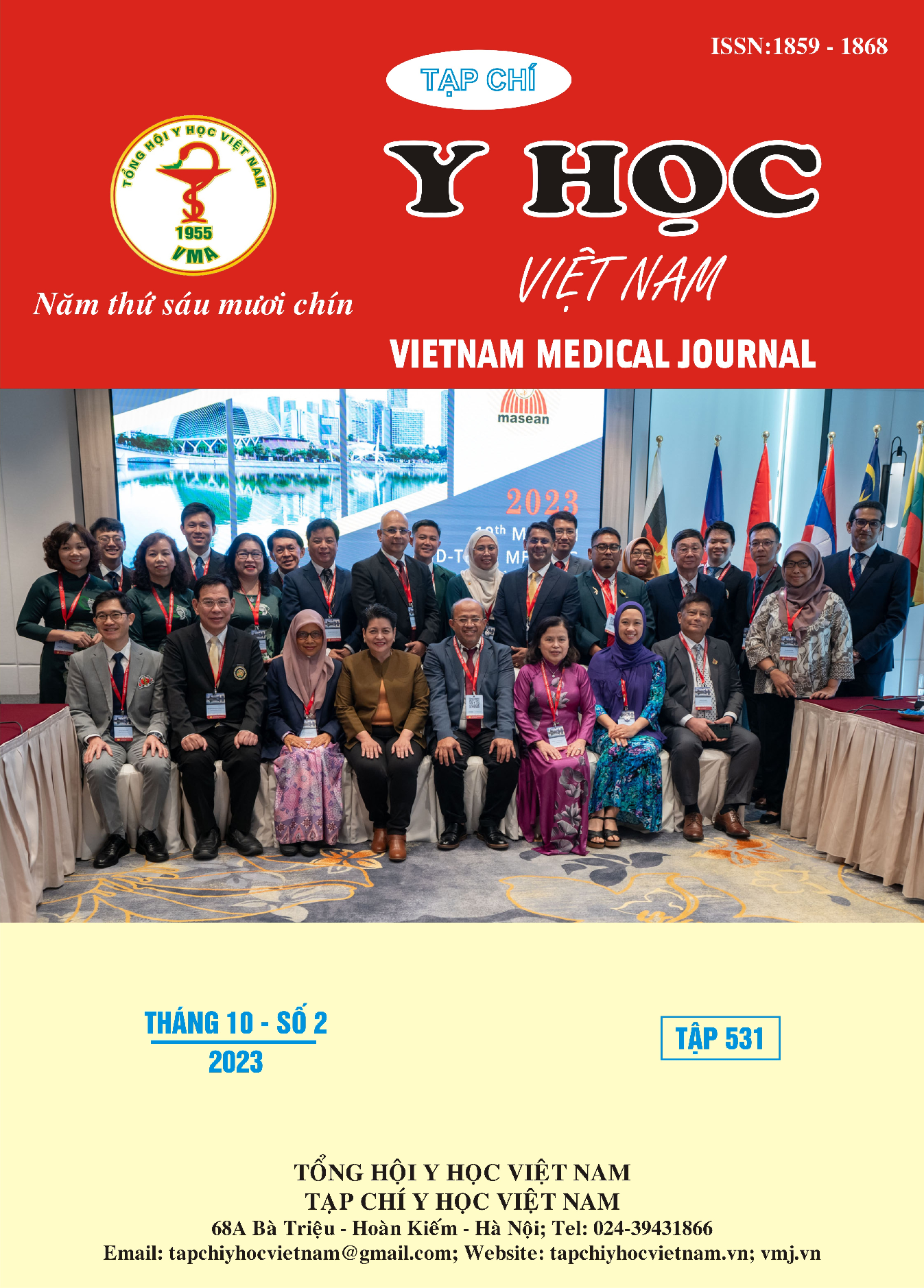IMMUNOHISTOCHEMICAL EXPRESSION OF Ki67 IN PANCREATIC DUCTAL ADENOCARCINOMA
Main Article Content
Abstract
Objective: To describe the immunohistochemical expression of Ki67 in pancreatic ductal adenocarcinoma and to analyze the survival time according to the Ki67 index in patients with pancreatic ductal adenocarcinoma. Material and method: Case series of 102 cases of pancreatic ductal adenocarcinoma operated at Cho Ray Hospital between March 2017 and December 2022. Results: The mean of the Ki67 index is 17.2±1.4%. The Ki67 index in the group with and without tumor necrosis was 20.5% and 13.3%, respectively; the difference is statistically significant (p=0.006). The Ki67 index at well, moderately, and poorly differentiated grades is 10.7%, 17.0%, and 19.7%, respectively; the difference is statistically significant (p=0.022). The Ki67 index at histological grades 1, 2, and 3 are 6.3%, 17.4%, and 19.3%, respectively; the difference is statistically significant (p=0.002). The mean survival time in the group with Ki67 index <10% and ≥10% was 24.7 months and 23.5 months, respectively; the difference is not statistically significant (p=0.614). Conclusion: Patients with tumor necrosis, moderately and poorly differentiated, and histological grades 2 and 3 had percentages of Ki67 stained cells higher than patients without tumor necrosis, well differentiated, and histological grade 1, significantly. The Ki67 index has not been shown to be a factor affecting the survival time of patients with pancreatic ductal adenocarcinoma.
Article Details
Keywords
Pancreatic ductal adenocarcinoma, tumor necrosis, differentiation, histological grade, perineural invasion, extrapancreatic spread, conventional, adenosquamous, colloid, Ki67 index, survival time.
References
2. Gill AJ, Klimstra DS, Lam AK, Washington MK. Tumours of the pancreas The WHO Classification of Tumours Editorial Board, eds. WHO Classification of Tumours – Digestive System Tumours. 5th edition. International Agency for Research on Cancer; 2019: 295-372.
3. Yamamoto S, Tomita Y, Hoshida Y, et al. Prognostic significance of activated Akt expression in pancreatic ductal adenocarcinoma. Clinical cancer research. 2004; 10(8):2846-2850.
4. Pergolini I, Crippa S, Pagnanelli M, et al. Prognostic impact of Ki-67 proliferative index in resectable pancreatic ductal adenocarcinoma. BJS Open. 2019; 3(5): 646-655.
5. Goitia-Duran MB, Linhares MM, Neto RA, et al. Expression of p53, p16 and Ki67 proteins in ductal adenocarcinoma of the pancreatic head and their relation with survivial and cell differentiation. Einstein (Sao Paulo). 2010; 8(4): 444-448.
6. Stanton KJ, Sidner RA, Miller GA, et al. Analysis of Ki-67 antigen expression, DNA proliferative fraction, and survival in resected cancer of the pancreas. Am J Surg. 2003;186(5):486-92.
7. Lebe B, Sagol O, Ulukus C, et al. The importance of cyclin D1 and Ki67 expression on the biological behavior of pancreatic adenocarcinomas. Pathology, research and practice. 2004; 200(5): 389-396.
8. Kim H, Park CY, Lee JH, et al. Ki-67 and p53 expression as a predictive marker for early postoperative recurrence in pancreatic head cancer. Annals of surgical treatment and research. 2015; 88(4): 200-207.
9. Myoteri D, Dellaportas D, Lykoudis PM, et al. Prognostic evaluation of Vimentin expression in correlation with Ki67 and CD44 in surgically resected pancreatic ductal adenocarcinoma. Gastroenterology research and practice. 2017: 9207616.
10. Luttges J, Schemm S, Vogel I, Hedderich J, Kremer B, Klöppel G. The grade of pancreatic ductal carcinoma is an independent prognostic factor and is superior to the immunohistochemical assessment of proliferation. J Pathol. 2000;191(2):154-161.


